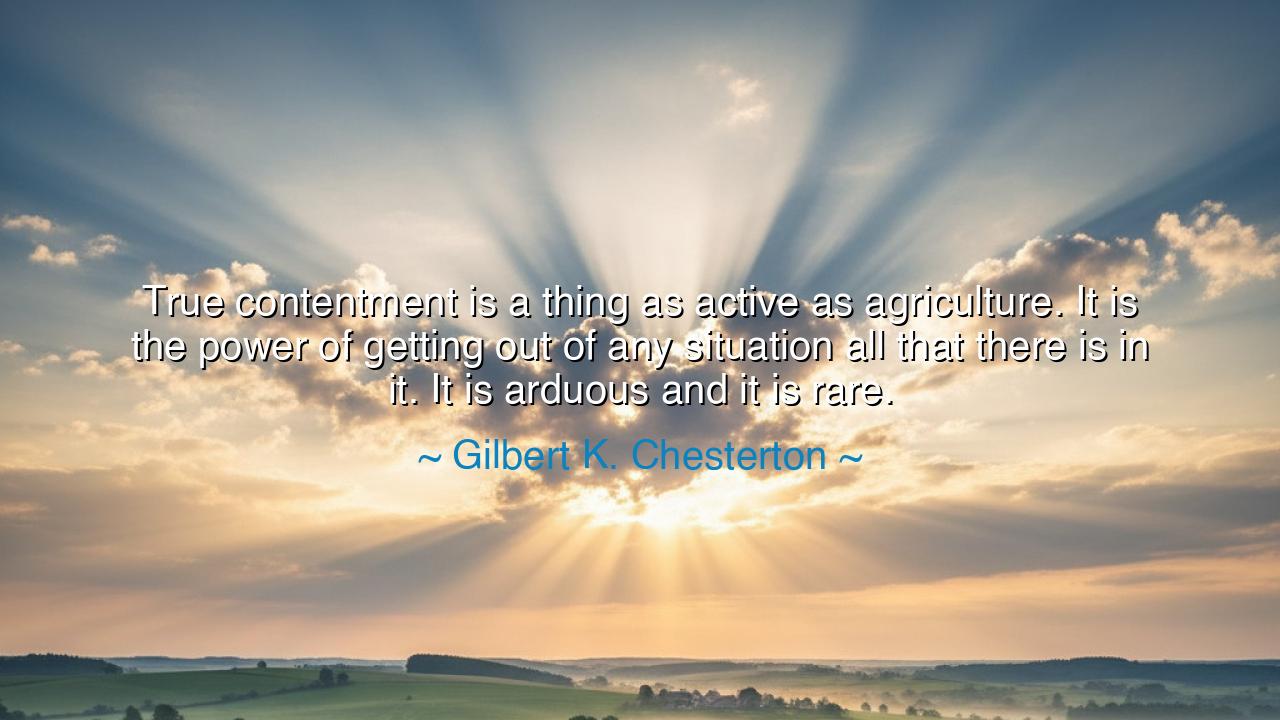
True contentment is a thing as active as agriculture. It is the
True contentment is a thing as active as agriculture. It is the power of getting out of any situation all that there is in it. It is arduous and it is rare.






G.K. Chesterton, master of paradox and prophet of common sense, declares that true contentment is no idle ease, but a labor as vigorous and noble as agriculture. It is not the sloth of resignation, but the discipline of extracting from every field of life all the fruit that lies hidden within it. To be content, he teaches, is to sow and reap in the soil of circumstance, to bend the back and steady the hand so that even hardship yields its hidden harvest. This is why he calls it both arduous and rare.
The ancients knew this wisdom in their bones. The farmer of old did not dream of perfect skies or faultless seasons, but labored with what was given—rain or drought, abundance or scarcity. In the same way, the soul that practices contentment does not wait for perfect fortune, but finds within each moment something to glean, something to nourish. It is the art of seeing treasure where others see only dust.
History bears witness in the life of Epictetus, the Stoic slave. Bound in chains and denied freedom, he yet declared himself free, for his master could not touch the liberty of his mind. From his suffering he drew lessons that have fed the spirits of men for centuries. His contentment was not passive, but active, a tilling of his own heart until even pain yielded wisdom. In him we see Chesterton’s words made flesh: the power to get out of any situation all that there is in it.
So too in modern times, one recalls Helen Keller, who, though deaf and blind, refused despair. Instead, she cultivated her soul like a fertile field, learning to speak, to write, and to inspire millions. She showed that contentment is not ease, but the triumph of spirit over circumstance. What others would see as barren ground, she turned into a garden overflowing with meaning.
Let the generations remember: true contentment is not found by waiting for life to soften, but by meeting it as the farmer meets his field—with patience, sweat, and faith. To draw richness even from hardship, to find joy even in sorrow, to see light even in shadow—this is the harvest of the rare soul. For most drift in complaint, but the few who labor to be content sow seeds that will outlast their own lives, feeding those who come after them with courage, peace, and hope.






TTThuy Thanh
This statement makes me reflect on the interplay between effort and perception. Does contentment arise more from changing how we interpret events, or from actively shaping circumstances to maximize fulfillment? It also raises philosophical questions: if contentment is arduous, does that mean it has intrinsic value precisely because it is not easy to achieve? I’m interested in exploring how literature, philosophy, or personal experience can guide people in cultivating this active, intentional approach to satisfaction in life.
MTMy Tam
I find the idea of contentment being rare both inspiring and daunting. It suggests that true satisfaction is not simply given, but earned through effort and attentiveness. How do we reconcile this with the modern emphasis on efficiency and speed, which often leaves little room for reflection? I’m also curious about the social implications—if contentment is rare, does it create a sense of isolation for those who pursue it seriously, or can it foster deeper connections with others who share this practice?
TDThuy Diem
This quote leads me to consider contentment as a dynamic skill rather than a static feeling. If it is something to be actively developed, how can people train themselves to extract the most from each situation? Could journaling, reflection, or deliberate mindfulness exercises help achieve this level of engagement with life? I also question whether there are limits to this approach—are there circumstances where even the most disciplined mindset cannot generate contentment?
THtien huy
Reading this, I feel challenged by the idea that contentment is rare and arduous. Does that imply most people live without fully extracting meaning from their experiences? I also wonder how culture, upbringing, or personal values influence one’s capacity for contentment. Are there universal principles that can help cultivate this quality, or is it inherently individual? It prompts reflection on whether society undervalues the daily practice of finding richness in ordinary circumstances.
HHieu
I’m intrigued by the comparison to agriculture. Just as farming demands patience, knowledge, and work to yield results, does true contentment similarly require deliberate attention to one’s circumstances? How much of contentment depends on external conditions versus an internal mindset? This perspective makes me question whether our modern pursuit of instant gratification undermines the ability to cultivate lasting satisfaction, and what strategies can help foster a more mindful and engaged approach to life.